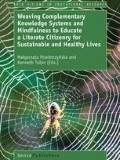Abstract
In this fictional narrative I represent two modes of human experience – active addiction and mindful sobriety – through the literary convention of alternating first-person limited-omniscient narrators.
Access this chapter
Tax calculation will be finalised at checkout
Purchases are for personal use only
Preview
Unable to display preview. Download preview PDF.
References
Aristotle. (1982). Poetics (J. Hutton, Trans.). New York, NY: W. W. Norton & Co.
Augustine. (1961). Confessions (R. S. Pine-Coffin, Trans.). London: Penguin.
Bakhtin, M. (1984). Problems of Dostoyevsky’s poetics (C. Emerson, Trans.) [Kindle version]. Retrieved from Amazon.com
Brooks, P. (1984). Reading for the plot: Design and intention in narrative. New York, NY: Alfred A. Knopf.
Cain, C. (1991). Personal stories: Identity acquisition and self-understanding in alcoholics anonymous. Ethos, 19(2), 210–253.
Heidegger, M. (1953/1996). Being and time (J. Stambaugh, Trans.). Albany, NY: State University of New York Press.
Husserl, E. (1931/2002). Ideas: General introduction to pure phenomenology (W. R. Boyce-Gibson, Trans.) [Kindle version]. Retrieved from Amazon.com
Kemp, R. (2009). The lived-body of drug addiction. Existential Analysis, 20(1), 120–132.
Kemp, R. (2011). The worlding of addiction. The Humanistic Psychologist, 39(4), 338–347.
Lave, J., & Wenger, E. (1991). Situated learning: Legitimate peripheral participation. Cambridge, MA: Cambridge University Press.
Ricoeur, P. (1979). The function of fiction in shaping reality. Man and World, 12(2), 123–141.
Ricoeur, P. (1984). Time and narrative: Volume 1 (K. McLaughlin & D. Pellauer, Trans.). Chicago, IL: University of Chicago Press.
Ricoeur, P. (1985). Time and narrative: Volume 2 (K. McLaughlin & D. Pellauer, Trans.). Chicago, IL: University of Chicago Press.
Ricoeur, P. (1988). Time and narrative: Volume 3 (K. Blamey & D. Pellauer, Trans.). Chicago, IL: University of Chicago Press.
Editor information
Editors and Affiliations
Rights and permissions
Copyright information
© 2017 Sense Publishers
About this chapter
Cite this chapter
Waldman, P. (2017). Of two Minds. In: Powietrzyńska, M., Tobin, K. (eds) Weaving Complementary Knowledge Systems and Mindfulness to Educate a Literate Citizenry for Sustainable and Healthy Lives. Bold Visions in Educational Research. SensePublishers, Rotterdam. https://doi.org/10.1007/978-94-6351-182-7_15
Download citation
DOI: https://doi.org/10.1007/978-94-6351-182-7_15
Publisher Name: SensePublishers, Rotterdam
Online ISBN: 978-94-6351-182-7
eBook Packages: EducationEducation (R0)

